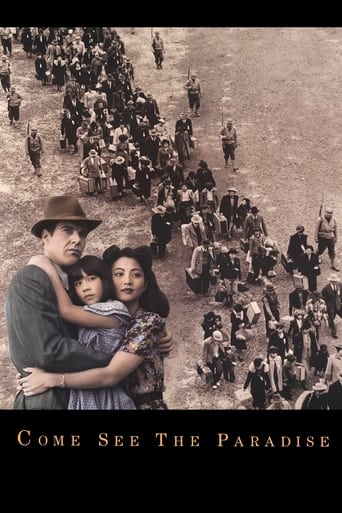vanillabean349
While I can't say I whole-heartedly hated this movie, I can't say I loved it either. In some ways, it attempts to make a difficult part of history more palatable for an American audience, and for this, I believe it deserves some commendation. However, to a large extent, the plotline of the film overshadows the historical events that it attempts to incorporate, and possibly even trivializes the hardships endured by people of Japanese descent during the 1930s and 1940s. The movie itself is centered around a cliché, star-crossed love story, leaving the majority of the historical features of the film as bits and pieces that are seemingly tacked on to give the film its validity. More than half of the film is spent on (albeit, poor) character development and introduction of the main conflict. As a result, the parts of the film that deal with internment and other injustices faced by people of Japanese descent are framed inherently as secondary aspects of the story. Internment and relocation were used as plot devices. Tense racial and/or ethnic conditions within camps and society are played down to make Jack and Lily's love more plausible. In many cases, Nisei and Issei were faced with systemic and often violent anti-Japanese sentiments that posed threats to personal wellbeing. In the camps, conditions were unsanitary and, due to the material losses some people suffered when forced to leave their houses so quickly during the relocation process, many internees were not able to afford appropriate medical care. This aspect is largely glossed over in the movie depiction. While I can go on about the issues I have with this film, I do believe it does a decent job of highlighting some of the important aspects of this period of history. Through the plot, Parker addresses the paradox of citizenship and loyalty, as well as other injustices and racism faced by the Japanese community during the 1930s and 1940s. Before World War II, people of Japanese descent were prevented from receiving citizenship by US immigration policies, but during internment, these people were also asked to swear loyalty to the United States, effectively challenging their identity as either Japanese or American. Similarly, there is some mention of the racism experienced by Nisei and Issei during this time, but it is often more generalized and even misguidedly incorporated into the screenwriting itself. Come See the Paradise walks the fine line between being historically valuable, and unfortunately frustrating to watch. What it lacks in historical accuracy, it makes up for in typical, sappy, Hollywood romance. This film could not be confused with a documentary, but for those seeking an interesting movie to watch, this is a decent choice if taken with a grain of salt.
efishbin
While the main plot line focuses entirely too much on the love story between Jack and Lily, there are some parts of the film that make it worthwhile.There was some redeemable aspects of the film. The setting shown after the Japanese were put into the camps was particularly powerful. We were able to see the vandalism and racism targeted at them during the weeks before internment, as well as the ghost towns left behind when they were forced out.. Some of the stereotypical responses of people who are put in camps were displayed in this picture. The father, an older man with a great sense a purpose before internment, completely lost his way in the camp. In Santo Tomas, where Americans were interned in the Philippines, there were similar instances of important men crumbling under the camp setting. The mother, who was not allowed to become a citizen of the United States, was told she could not help make camouflage military nets, even though she just wanted to be doing something and was not working for pay like her daughters. Though boredom is not the worst thing a person interned could experience, it shows how restricted they were. She simply wanted something to do but was not allowed because she was Japanese. The son, Charlie, developed a deep connection to his ancestor's homeland of Japan though he had never even been there and spoke little Japanese. The targeting and persecution forced him to embrace and learn more about his heritage and ultimately return to Japan. And opposite him was the son, Harry, who joined the U.S Army and died in service. Harry, a rational man who tended to err on the side of caution, did what he thought was safest for him, though it turned out to be the cause of his death. The different outcomes of these characters shows the ways people can react to internment, even within the same family.
ejs170639
While I applaud the writers, producers, and directors for their attempt to depict the Japanese-American experience during WWII, the execution was dire at best. The script was poorly written and poorly produced. In fact, I cannot decide which was worse the writing or the acting. The entire role of Dennis Quaid was annoying, and its only practical advantage was an awkward fumbling of a love story. I take it this narrative was intended to attract a larger audience. To be fair, American audiences are not historians per se, and likely want a dramatic love affair. The one redeeming quality of the film was the use of props and scenery. I suppose the budget allowed for an acceptable rendition of a west coast city in the 1940s.
As for the historical accuracy, the film did convey generational tension and discussed the relevance of national identity during the war. Generational tension was depicted when Lily was pleading with her mother, after their long estrangement due to her marriage to Jack. She spoke in English, while her mother responded in Japanese. Another instance of generational tension was when Lily's brother refused to speak to his father, who her brother thought gave information to American intelligence. National identity was depicted by the discussion concerning the questionnaire that asked internees to pledge loyalty to the United States. Furthermore, the film showed the protests of the Japanese Citizen League within the camp. Overall the camp experience was portrayed accurately. Japanese-Americans endured forced migration to makeshift camps in the desert where they were held unconstitutionally.
NateWatchesCoolMovies
Alan Parker's Come See The Paradise tackles a little spoken of, tragic period of American history: the internment of thousands of Japanese families in prison camps following the attack on Pearl Harbour, which sparked World War II. After the incident, a wave of frenzy and paranoia roiled across the states, and many of these people were separated from their loved ones for years, an event that altered thousands of lives, but not one you hear too much about in film. Parker is a born storyteller, whether it's historical lore or Gothic genre brilliance (insert obligatory Angel Heart reference), and here he approaches the subject matter with little to nothing in the way of melodrama, classic orchestral swells or tissue box bait, letting the story happen naturally and neutrally, the drama organically rising scene to scene as they happen. Dennis Quaid plays an Irish American man who falls in love with a Japanese girl (Tamlyn Tomita), and over a few years begins a life with her. He is a fiercely independent union man, passionately fighting for the working class, while she comes from a very tight knit family who rely on each other to make ends meet. Somehow the two of them make it work amidst the early stages of the American working machine, the love they have for each other keeping them afloat. Then the attacks occur. Quaid is separated from her and their daughter for over a decade, and the film's pacing makes you feel every lost, broken moment of it. When their reunion does happen, it's nothing like the romantic, tear jerking catharsis you'd expect, but a testament to Parker's commitment to realism. The sadness comes from the hollow, unceremonious way in which these people are affected by such things, and how they simply go on, adapt and adjust, the pain an intrinsic part of everyday life. The movies show a different picture of that usually, an idealistic bubble where things always somehow end up alright, and every last thread is tied off somehow. Not with this one, which is why it may have been forgotten. In any case, it's a beautifully tragic, eye opening piece that stays true to its narrative and follows it's characters throughout bittersweet, minimalistic and believable arcs.




